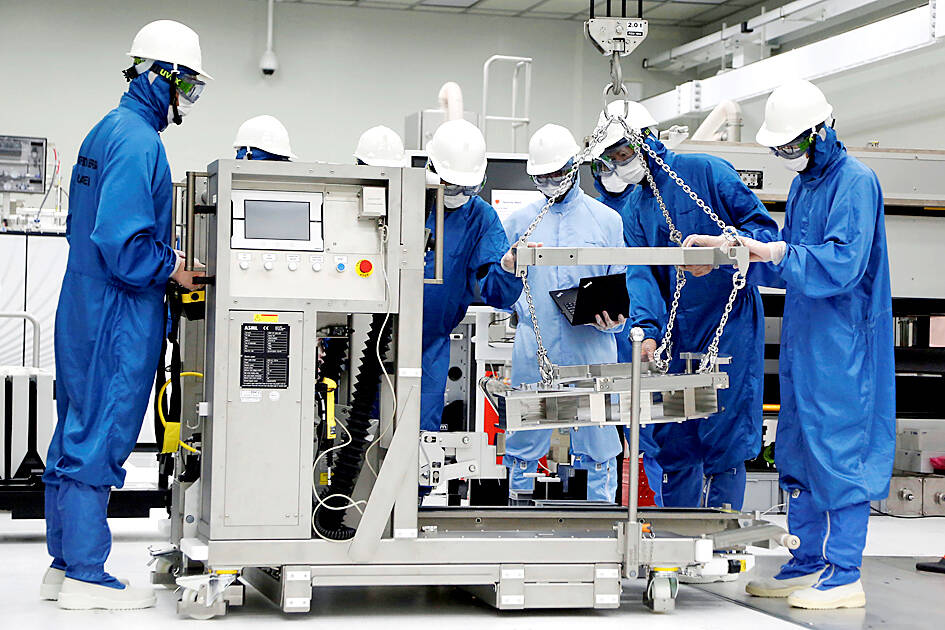The semiconductor industry is facing a talent shortage as the proportion of university students majoring in science, technology, engineering and mathematics (STEM) fields has been declining, a report by the Legislative Yuan said.
Subjects in STEM fields include life science, environmental science, physical chemistry, earth science, mathematics, information and communication technology, engineering, manufacturing and processing, as well as building and construction engineering, the Ministry of Education said.
The proportion of STEM students in colleges and universities, as well as STEM graduates in recent years are far lower than those in 1991, the report prepared by the legislature’s Budget Center said.

Photo: Ann Wang, Reuters
The number of doctoral, master’s and undergraduate students studying in STEM fields dropped by 17.15 percent from 2012 to 2021, and the number of graduates fell by 21.31 percent from 2011 to 2020, the report said.
The number of doctoral students in STEM fields declined by 26.34 percent from 2012 to 2021 and the number of doctorate holders reduced by 23.63 percent from 2011 to 2020, it said.
The proportion of doctoral, master’s and undergraduate students in STEM fields among total students from 2012 to 2021 dropped by 8.9, 1.51 and 1.77 percentage points respectively from 2011 to 2020, it said.
In response to the talent shortage in STEM fields, the ministry has designated semiconductor, artificial intelligence, smart manufacturing, circular economy and finance sectors as “national key fields,” it said.
The ministry approved 10 research institutes in these fields set up by nine universities as of the end of July last year, it said.
National Yang Ming Chiao Tung University, National Cheng Kung University, National Tsing Hua University and National Taiwan University have established semiconductor research institutes, it said.
National Sun Yat-sen University has established semiconductor and finance research institutes; National Taiwan University of Science and Technology has established artificial intelligence and smart manufacturing research institutes; National Chung Hsing University has established a circular economy research institute; and National Taipei University of Technology has established an artificial intelligence research institute, it added.
As these institutes are in preliminary stages, the effectiveness remains to be seen, it said.
Talent shortages in the semiconductor industry have been expanding, it said, citing white papers on talent in the semiconductor industry released by 104 Job Bank.
Research and development engineers are the most important roles businesses that are undergoing transformation seek to fill, it said.
However, a lack of students and graduates, especially at the doctorate level, in the STEM fields could exacerbate the shortages, it added.

Taiwan has received more than US$70 million in royalties as of the end of last year from developing the F-16V jet as countries worldwide purchase or upgrade to this popular model, government and military officials said on Saturday. Taiwan funded the development of the F-16V jet and ended up the sole investor as other countries withdrew from the program. Now the F-16V is increasingly popular and countries must pay Taiwan a percentage in royalties when they purchase new F-16V aircraft or upgrade older F-16 models. The next five years are expected to be the peak for these royalties, with Taiwan potentially earning

STAY IN YOUR LANE: As the US and Israel attack Iran, the ministry has warned China not to overstep by including Taiwanese citizens in its evacuation orders The Ministry of Foreign Affairs (MOFA) yesterday rebuked a statement by China’s embassy in Israel that it would evacuate Taiwanese holders of Chinese travel documents from Israel amid the latter’s escalating conflict with Iran. Tensions have risen across the Middle East in the wake of US and Israeli airstrikes on Iran beginning Saturday. China subsequently issued an evacuation notice for its citizens. In a news release, the Chinese embassy in Israel said holders of “Taiwan compatriot permits (台胞證)” issued to Taiwanese nationals by Chinese authorities for travel to China — could register for evacuation to Egypt. In Taipei, the ministry yesterday said Taiwan

Taiwan is awaiting official notification from the US regarding the status of the Agreement on Reciprocal Trade (ART) after the US Supreme Court ruled US President Donald Trump's global tariffs unconstitutional. Speaking to reporters before a legislative hearing today, Premier Cho Jung-tai (卓榮泰) said that Taiwan's negotiation team remains focused on ensuring that the bilateral trade deal remains intact despite the legal challenge to Trump's tariff policy. "The US has pledged to notify its trade partners once the subsequent administrative and legal processes are finalized, and that certainly includes Taiwan," Cho said when asked about opposition parties’ doubts that the ART was

If China chose to invade Taiwan tomorrow, it would only have to sever three undersea fiber-optic cable clusters to cause a data blackout, Jason Hsu (許毓仁), a senior fellow at the Hudson Institute and former Chinese Nationalist Party (KMT) legislator, told a US security panel yesterday. In a Taiwan contingency, cable disruption would be one of the earliest preinvasion actions and the signal that escalation had begun, he said, adding that Taiwan’s current cable repair capabilities are insufficient. The US-China Economic and Security Review Commission (USCC) yesterday held a hearing on US-China Competition Under the Sea, with Hsu speaking on